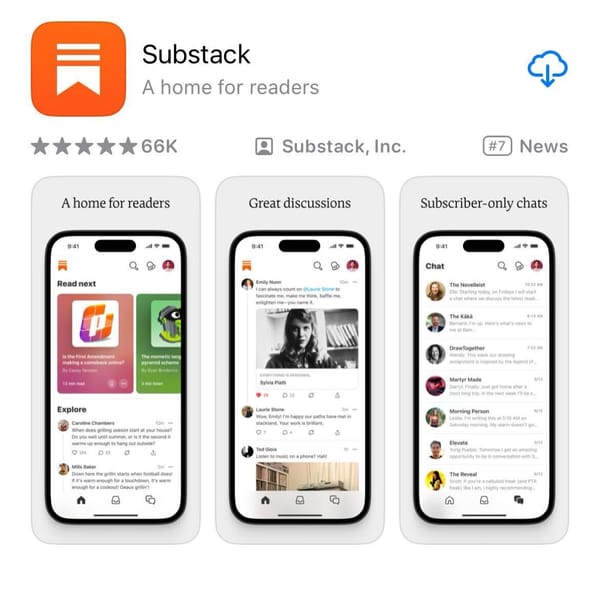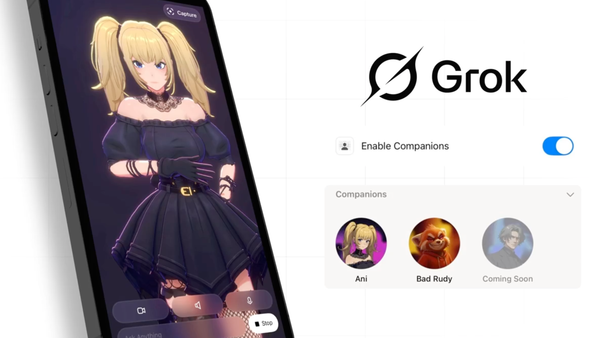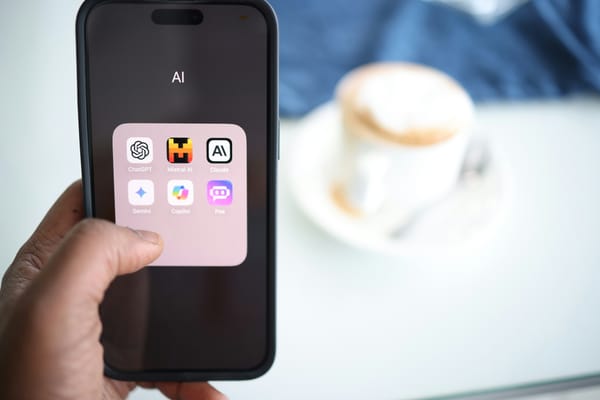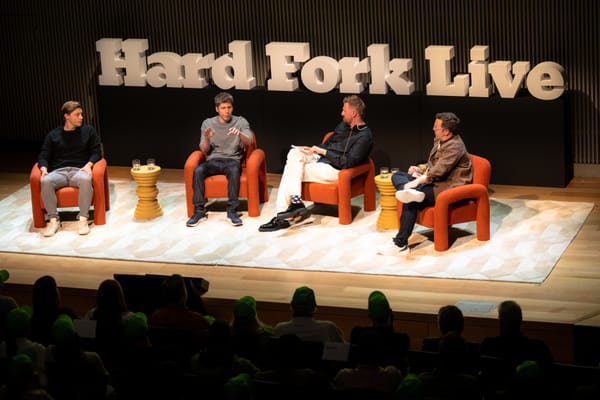Clubhouse's moment arrives
Elon Musk disrupts podcasting. PLUS: Robinhood's big mistake

I. Andreessen Horowitz and the backdoor pilot
Hey, did you hear Elon Musk went on Clubhouse?
The media and venture capital worlds were abuzz this weekend in advance of, during, and after Musk’s appearance on the not-quite-year-old audio social network. Musk is not exactly a recluse — he gives interviews more or less regularly to a variety of mainstream outlets, and will sit down with NBC tomorrow — but his arrival on Clubhouse served as validation for the company and the idea of live, interactive audio streaming more generally.
Despite beginning at 1AM ET on Monday, Musk’s room quickly hit the Clubhouse cap of 5,000 concurrent listeners — as did one overflow room hosting a broadcast of his appearance, and then another overflow room after that. All day long, hustlers and hucksters sought to get in on the action, hosting pre-show discussions, post-show recaps, and in at least one case, a cash giveaway sponsored by Square.
The only social-networking moment I can compare it to in recent years would be the 2015 South by Southwest festival, when the streets of Austin were briefly overrun by people broadcasting themselves on Meerkat. Then, as now, the once-stable field of social networks hummed with a fresh sense of possibility.
On Clubhouse Musk appeared on The Good Time Show, a roughly three-week-old late-night event hosted by the husband-and-wife team of Sriram Krishnan and Aarthi Ramamurthy. Guests and co-hosts on their show often include the partners of Andreessen Horowitz, Clubhouse’s lead investor and most prominent public cheerleaders.
I’ve known Krishnan and Ramamurthy since 2012, when I interrupted their coffee date at the Creamery in San Francisco to interview them for a story about the cafe’s emergence as a hub for tech-boom dealmaking. Krishnan went on to work in product roles at Facebook, Snap, and Twitter, and Ramamurthy started an e-commerce company and now works at Facebook.
The tone of their show is lightweight by design — successful tech people getting together after they put their kids to bed to discuss the news of the day, without ever being too critical of anyone involved. In this aspect, the show is tonally consistent with the mission that Andreessen Horowitz laid out last week in its blog post announcing that it would create “a new media property” aspiring to be “the go-to place for understanding and building the future, for anyone who is building, making, or curious about tech.”
Mainstream tech coverage in recent years has become, in the sharp framing of Ben Thompson, dominated by rational skeptics; A16z spotted a gap in the market, and now seeks to fill it with rational optimism. A16z can serve that audience by creating its own media empire out of blog posts and podcasts, which is already performing quite well under the leadership of Sonal Chokshi. But it can also serve that audience by funding and promoting services like Clubhouse, which enable optimists like Krishnan and Ramamurthy to build miniature properties of their own and “go direct” to an audience eager to hear a chummy conversation with the heroes of capitalism.
At least, that’s how it seemed before news came out on Monday that Krishnan himself had recently become a general partner at A16z. And that the firm is releasing the conversation officially as the first episode in a new live podcast series.
In the television industry, a “backdoor pilot” is a kind of proof of concept of a full series: an episode of an existing show that introduces characters who go on to have their own show. There are a bunch of ways to think about Clubhouse, but I think it is notable and will be consequential that one of the first successful uses of Clubhouse was to create a backdoor pilot for a venture capital firm’s end run around the mainstream media.
II. What Clubhouse discovered
This is not the most interesting way of thinking about Clubhouse, though.
In 2016, a startup called Anchor launched with a product its founders hoped would “democratize radio.” It offered some dead-simple creation tools for recording audio, a place to host that audio, and some social features to let you find and follow other creators. The team struggled to find product-market fit — maybe the recordings should feel more like Snapchat stories, it asked, fruitlessly, at one point? — and few hit podcasts emerged from the platform. Still, Spotify ultimately bought Anchor for $150 million.
I haven’t listened to a ton of Anchor podcasts, but most that I listened to were terrible. It turns out that podcasts do not lend themselves easily to a do-it-yourself approach. It’s hard to record pristine audio; it’s even more tedious to edit. And the podcast market is now robust enough that there are almost certainly numerous professionally recorded podcasts, hosted by celebrities in their field, that would be more fun to listen to than any DIY project uploaded to Anchor.
Fast-forward to 2021, though, and I’m spending real time on Clubhouse. Yes, I’ve had my concerns about Clubhouse’s early inattention to moderation. But the company now seems to be taking those concerns appropriately seriously. And while I’m tempted to blame the 30- and 40-minutes stretches I’ve spent listening to people talk about various aspects of tech and life on an 11-month quarantine, I also want to acknowledge that Clubhouse has hit upon something genuinely compelling.
Unlike the median Anchor show, the median Clubhouse room isn’t unbearable to listen to. Because you’re literally on the phone while you use it, the mediocre audio quality doesn’t grate as much — it just sounds like a phone call. (Albeit one you could join at any time.) And because the conversation is live, you’re less sensitive to the fact that it’s unedited.
As Musk’s appearance highlighted, there’s a serendipity about Clubhouse that makes it compelling. The most interesting part of his talk wasn’t the first half-hour or so, where he fielded softballs about colonizing Mars and his favorite memes, but later, when he invited Robinhood CEO Vlad Tenev onto the stage.
Robinhood had, of course, had a hell of a week, and Musk has been vocally skeptical about the company’s moves to stop users from buying GameStop stock. “Everyone wants to know, did something shady go down here?” Musk asked Tenev. In response, Tenev explained how regulators had required Robinhood to increase its deposits to cover the risks associated with market volatility. Essentially, Robinhood had enabled a mob whose trades it could briefly not afford.
This was not exactly investigative journalism on Musk’s part, and Robinhood PR had posted a variation of this explanation on its blog earlier this weekend (though without as much detail). And A16z is a major investor in Robinhood, as it is with Clubhouse, giving the whole thing the feel of a stunt. As Eric Newcomer put it: “So undisclosed future a16z partner hosts event with a16z partner where a16z portfolio company does crisis PR but it's billed as this big organic thing with Elon Musk?”
It’s a fair point, but it also skips over the absolute novelty of the world’s richest man lightly interrogating the CEO of the week’s most controversial company in a live, free broadcast. From Facebook to Twitter to Twitch, streaming video tools have been available for years now, but we’ve never seen them used quite like this. There’s something more approachable about an audio-only broadcast that seems to have enabled entirely new uses.
I thought about this last week when my friend Maran Nelson and I started a room to talk with Newcomer about his recent piece on A16z and its independent media ambitions. Before I knew it, roughly a thousand people were there, including Marc Andreessen himself, and a number of other A16z partners. Two of them, Margit Wennmachers and Andrew Chen, came on stage along with Chokshi to respond to our questions.
This isn’t shocking, exactly — I have met all these people in person various times over the years — but the serendipity of it all took me by surprise. I pondered for a moment how long it would have taken to schedule a call with me, four Andreessen partners, and the dozen-plus tech reporters who showed up to listen. Years, I imagine. But on Clubhouse, Maran and I just tapped a few buttons on our phones and immediately we were having a productive discussion about the increasingly fraught relationship between some VC firms and prominent journalism outlets.
By the diminished standards of pandemic-era social life, I found it exhilarating.
When Medium launched in 2012, two things about it struck me immediately. The first was that the design, particularly of its content management system, was radiant. The second was that it filled an obvious hole in the media market: it gave people a place where they could blog without any expectation that they would keep blogging. In the 2000s, every person’s second blog post began with an apology for having taken so much time to write it after the first one. Medium made that forever unnecessary by telling people they could just write whenever inspiration struck, and it would promote them when they did.
Today we are absolutely awash in podcasts. By now it seems that every person of note has been interviewed by every other person of note on one podcast or another. And yet if you want to reach the sort of person who listens to podcasts, starting a regular podcast and building up its audience over time has really been your only option.
That’s fine for dedicated podcasters. But if you’re Elon Musk, and just want to ask Vlad Tenev a few questions in front of an audience? Well, now you go on Clubhouse. Like Medium, it’s there when he needs it, and never needs to be thought about otherwise. It offers him all the distribution upside of a podcast without the planning or editing that recording an actual podcast would entail.
It’s what Anchor tried to become and never quite did.
III. Robinhood’s big mistake
And what of Robinhood?
It’s amazing how, given how conspiracy-laden last week’s most viral posts about the company were, how mundane the explanation for everything seems to be. Robinhood has to keep a certain amount of money in reserve to enable its platform; that amount of money rose tenfold amid meme stock mania; the platform shut down purchases of those meme stocks while it worked to resolve the imbalance.
As of Monday, it had raised two new rounds of funds. The first was $1 billion; the second was $2.4 billion. It is gradually letting people buy stocks again. And while thousands of people appear to have quit Robinhood over the momentary inconvenience, hundreds of thousands more people signed up to use Robinhood for the first time.
Given the situation, lots of folks are asking why Robinhood didn’t say more about what happened when it first halted sales of GameStop stock. Perhaps the company was simply embarrassed — “we built a platform we can no longer afford” is admittedly a funny thing to tell your user base — but it’s also easy to imagine an official company Reddit post headlined “LOL you crazy bastards literally broke Robinhood” being showered in upvotes and karma.
Instead, by trying to hide a liquidity crisis, Robinhood created a brand crisis. A liquidity crisis is easy for a company like Robinhood to get out of — you just raise more money from the people who are lining up to hand it to you. A brand crisis, though, is a much trickier proposition to navigate. Robinhood told users that it existed to “democratize” finance; in the end, like so many other platforms, it turned out to be a monarchy.
I’m interested to see how the company will fare now that the jig is up.
Elsewhere: Who’s ready for two movies about WallStreetBets?
Also: Today’s edition was running pretty long, so I saved a bunch of links from Sunday and Monday for the Tuesday edition. If you have strong feelings about this of any sort I am all ears.
The Ratio
Today in news that could affect public perception of the big tech companies.
🔃 Trending sideways: An analysis of Apple’s new privacy and nutrition labels found a variety of misleading statements. Just like you’d find on a regular nutrition label! (Geoffrey Fowler / Washington Post)
⬇️ Trending down: Google salvaged Robinhood’s one-star rating by deleting nearly 100,000 negative reviews. If you want to buy a stock on a stock-buying app, and the app won’t let you buy the stock, and you want to leave a one-star review … shouldn’t that be allowed? (The answer, as of late Monday, appeared to be yes.) (Jay Peters / The Verge)
⬇️ Trending down: A Google blog post incorrectly stated that Snap would be one of its primary cloud clients in Saudi Arabia, triggering human rights concerns — but apparently it wasn’t true. Why Google wants to draw attention to its work in Saudi Arabia in the first place is beyond me, but I would love to see the emails that Snap must have sent Google over this one. (Issie Lapowsky / Protocol)
Governing
⭐ The Robinhood stock mania of the past week bears more than passing resemblance to the rise of TheDonald, according to this astute analysis. John Herrman describes how various dynamics of Reddit combined to make WallStreetBets possible in the New York Times:
In addition to providing a staging ground for some of Mr. Trump’s supporters, The_Donald was at war, immediately, with the platform around it. It made a mockery of Reddit’s rules, and of its stated intentions around cultivating communities. The_Donald ruthlessly antagonized other candidates’ subreddits, then Reddit as a whole. Among its unspoken rules was an expectation that users manipulate the platform as a matter of course, upvoting pro-Trump content regardless of its relative quality, because doing so would make it visible to users elsewhere on the platform, or force Reddit to intervene, inviting the Redditors to cry censorship. This strategically disingenuous approach proved effective, not just on Reddit but well beyond it.
A potent mixture of nihilism, obfuscating humor and a clear common goal was paired with “a kind of lock-step moderation that adheres very closely to the Reddit terms of service,” said Ms. Swartz. “Anyone who has ever done any type of moderation knows that it’s really hard to sustain a healthy community. It’s really hard to keep everyone happy and to moderate,” Ms. Swartz said. “If your goal isn’t to create a healthy discussion community, but rather to make power and memes that can spin out elsewhere, that’s quite a bit easier.” The_Donald eventually became an administrative nightmare for Reddit, all but breaking the site. Up until it was banned by Reddit last year, it executed its purpose efficiently. One reason it survived as long as it did, according to the company, is because its moderators remained “cooperative.”
Reddit CEO Steve Huffman said the company monitors a previously unknown metric known as “Daily Active Shitheads.” I would … like to hear more about this. (Alex Sherman / CNBC)
It doesn’t matter how mad you are, you probably still won’t win your lawsuit against Robinhood. Legal analysts say Section 230 and its user agreement make any cases unlikely to succeed. (Tom Hals / Reuters)
Google will begin allowing betting and gambling apps in more countries, including the United States. I mean, why should Robinhood have all the fun? (Abner Li / 9to5Google)
Facebook is looking for a new head of US head of policy. Kevin Martin, who holds the job now, is a Republican and moving to another role within the company. (Ashley Gold / Axios)
The Chan Zuckerberg Initiative announced a new $350 million effort focused on criminal justice reform. It’s part of a strategic effort to spin out most of its political program to outside groups, according to this report. (Theodore Schleifer / Recode)
A new web standard called Global Privacy Control allows users to opt out of all third-party data tracking with a single click for websites that have enabled it. Browsers from Brave and DuckDuckGo now send the GPC signal by default. (Russell Brandom / The Verge)
Industry
⭐ Facebook is developing newsletter tools that would challenge Substack and Twitter. Extremely curious to see what these look like — and what Facebook’s terms will be. Mike Isaac had the scoop at the New York Times:
The product, which is still in its earliest stages, could be similar to those of other newsletter companies, according to the people, who spoke on the condition of anonymity because they were not authorized to do so publicly. That could include features to help writers build their followers on Facebook and curate their email lists, the people said, as well as paid subscription tools to help journalists make money from their newsletters.
The effort would be part of the Facebook Journalism Project, which is managed in New York, the people said. Mark Zuckerberg, Facebook’s chief executive, is supportive of the initiative, said the people, and has encouraged a team of dozens of engineers to pursue it.
Facebook is preparing an antitrust lawsuit against Apple, alleging the company forces it to follow App Store rules that Apple itself ignores. So one plank of Facebook’s strategy in fighting off the government’s antitrust case will be arguing that Facebook itself is being unfairly harmed by competition? (Alex Heath and Josh Sisco / The Information)
Facebook is developing tools that would prevent News Feed ads from running next to topics like crime and politics. “Topic exclusion” controls will soon begin testing with a small group of advertisers. (Megan Graham / CNBC)
Facebook hired its first chief compliance officer. Henry Moniz, who joins the company from ViacomCBS, arrives as Facebook is getting more regulatory scrutiny than ever. (Kanishka Singh / Reuters)
WhatsApp added biometric authentication to its web and desktop versions. Use it by February 8 or your account will be deleted. Just kidding!! (Ingrid Lunden / TechCrunch)
Google opened its first Safety Engineering Center in Dublin to focus on the spread of illegal and harmful content. The center will help the company comply with new rules around harmful content that are expected to take effect in Europe in coming years. (Foo Yun Chee / Reuters)
A single Clubhouse user invited hundreds of journalists to join the app in an effort to increase the amount of scrutiny the platform receives. After the reporters arrived, Clubhouse quickly announced new investments in moderation. Sarah Szalavitz: we stan. (Ellen Huet / Bloomberg)
Reddit-like ShareChat is surging in India. Twitter has already invested in the company, which offers no English-language option, and Google and Snap are rumored to be considering investments as well. (Shubham Agarwal / Fast Company)
YouTube’s TikTok rival, Shorts, is getting 3.5 billion daily views in India after launching there in September. It’s one of a number of short-form video products to begin succeeding there following the country’s TikTok ban. (Jennifer Elias / CNBC)
Those good tweets
Robinhood should just go full heel and announce they're adding stories to the app
— Morning Brew ☕️ (@MorningBrew) 5:38 PM ∙ Jan 28, 2021
Not sure about Robinhood's new landing page.
— Rob Beschizza (@Beschizza) 4:04 PM ∙ Jan 28, 2021
— Blepps (@bleppyman) 5:51 PM ∙ Jan 29, 2021
Two elderly British ladies greeting each other
— Andy Ryan (@ItsAndyRyan) 2:23 PM ∙ Jan 27, 2021
Talk to me
Send me tips, comments, questions, and Clubhouse rooms: casey@platformer.news.





